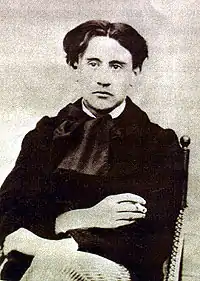Édouard Cortès
Edouard Léon Cortès (1882–1969) was a French post-impressionist artist of French and Spanish ancestry. He is known as "Le Poète Parisien de la Peinture" or "the Parisian Poet of Painting" because of his diverse Paris cityscapes in a variety of weather and night settings.
Edouard Cortès | |
|---|---|
 Edouard Cortès as a young man | |
| Born | 6 August 1882 Lagny-sur-Marne, France |
| Died | November 26, 1969 (aged 87) Lagny-sur-Marne, France |
| Nationality | French |
| Education | His father Antonio Cortès, École des Beaux-Arts |
| Known for | Cityscapes, Paris |
| Movement | Post-Impressionism |
Personal life
Cortes was born on August 6, 1882, in Lagny-sur-Marne, about twenty miles east of Paris. His father, Antonio Cortés, had been a painter for the Spanish Royal Court.
In 1914 Cortès married Fernande Joyeuse, with whom he had a daughter, Jacqueline Simone, in 1916. The depiction of a woman with a child is repeated throughout his work, a possible reference to Joyeuse and Jacqueline.
Although Cortès was a pacifist, when war came close to his native village he was compelled to enlist in a French Infantry Regiment at the age of 32. Sent to the front lines, Cortès was wounded by a bayonet, evacuated to a military hospital, and awarded the Croix de Guerre. After recovery he was reassigned to use his artistic talent to sketch enemy positions. Later in life his convictions led him to refuse the Légion d'Honneur from the French Government. In 1919 he was demobilized.[1]
His wife died in 1918, and the following year he married his sister-in-law, Lucienne Joyeuse.
Cortès lived a simple life amid a close circle of friends. He died on November 26, 1969, in Lagny, and has a street named in his honor. [2]
Painting history
At the age of 17, Edouard began his studies at the École des Beaux-Arts in Paris. His first exhibition in 1901 brought him immediate recognition. Cortès stressed his independence. Once, in responding to a journalist who asked if he was a student of Luigi Loir, he replied in pun: "Non, seul élève de moi-même." ("No, a student of myself only.")
His works were first exhibited in North America in 1945 and he subsequently achieved even greater success. In his last year of life he was awarded the prestigious Prix Antoine-Quinson from the Salon de Vincennes. [2]
Lost and stolen paintings
On November 30, 2000, four paintings by Cortès were recovered in Kalispell, Montana, following an eight-month investigation conducted by the FBI's San Francisco Division. The recovered paintings were stolen in 1988 during a burglary at the Simic Gallery in Carmel, California.[3]
In 2008, a lost Cortès painting of a Paris street scene was discovered amongst donated items at a Goodwill Industries thrift store in Easton, Maryland. After an alert store manager noticed that it was a signed original, the painting was subsequently auctioned for $40,600 (US) at Sotheby's.[4] In 2019, a previously unknown work, Place de la Republique en Soir was discovered in Paris.[5]
References
| Wikimedia Commons has media related to Édouard Cortès. |
- "Edouard Leon Cortès". Virtual Catalogue Raisonné. Retrieved 9 November 2019.
- Klein, David (1999). Edouard Cortès, Le Poète Parisien de la Peinture (in French). Hong Kong: Klein Art Gallery. ISBN 0-9672343-0-1.
- FBI Theft Notices & Recoveries. "FBI — Art Theft Program". Archived from the original on May 9, 2007. Retrieved 2007-05-20.
- "Easton Team Scores Big!" (II). Goodwill Connection. 2008: 8. Cite journal requires
|journal=(help) - Gural, Natasha. "World's Preeminent Dealer Of Edouard Cortès Obtains Immaculate Painting That Emerged After 114 Years". Forbes. Retrieved 1 May 2019.
External links
- Pair Of Edouard Cortès Paintings, Including Remarkably Rare ‘Moulin Rouge’, Quickly Acquired By Elite Collector From World Expert After Six Decades Unseen
- World's Preeminent Dealer Of Edouard Cortès Obtains Immaculate Painting That Emerged After 114 Years
- Virtual Catalogue Raisonne for the Complete Works of Edouard Leon Cortes
- Official website(in French)
- Edouard Cortes Bio - Findlay Galleries
- Édouard Cortès at Curlie
- Edouard Cortès (1882–1969): Paris and the French Countryside Revealed, biography and article from the Royal Alberta Museum
- Edouard Cortès at the Art Renewal Center
- Rehs Galleries:
- Country Life: Scenes in Normandy & Brittany, exhibit featuring works the artist produced in the countryside outside Paris
- Paris: Part I, exhibit featuring numerous early works by the artist.
- Paris: Part II, exhibit featuring numerous mid career works by Cortes
- Edouard Leon Cortes Biography.